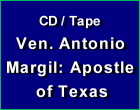Stories & Legends
 |
 |
 |
 |
 |
 |
 |
St. Ambrose & His Dispute with the Emperor
It is found written in a chronicle that the Emperor Theodosius was filled with fury because in the city of Thessalonica the people had stoned to death the judges who were sent there in his name. To avenge that bad deed, the Emperor returned evil for evil, and ordered that his soldiers should slay 5,000 persons, great and little, good and evil, as well those who had no part in the crime as those who had deserved it.
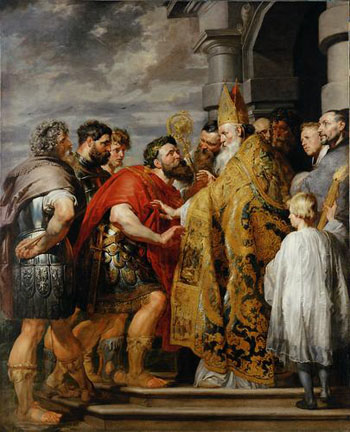 After this had been done as he ordered, the Emperor went to Milan. When he came before the church to enter into it, St. Ambrose came against him and prevented him from entering, and said to him: “After so great an evil that thou hast done, thou ought not to show such great presumption, for thy great power does not suffer thee to enter without acknowledging thy trespass. For it is so that reason surmounts power. Thou art Emperor, and indeed it falls to thee to punish the evil people. But thou has punished alike the innocent.
After this had been done as he ordered, the Emperor went to Milan. When he came before the church to enter into it, St. Ambrose came against him and prevented him from entering, and said to him: “After so great an evil that thou hast done, thou ought not to show such great presumption, for thy great power does not suffer thee to enter without acknowledging thy trespass. For it is so that reason surmounts power. Thou art Emperor, and indeed it falls to thee to punish the evil people. But thou has punished alike the innocent.
“So then, how can thou be so bold as to enter into the house of God Whom thou has horribly angered? How dare thou with thy feet touch His pavement? How dare thou stretch out thy hands, which be all bloody and from which the blood of innocents runs and drops off? And by what presumption dost thou dare to put forth thy mouth to receive the precious Body and Blood of Our Lord, when from that mouth hast come the command of the Devil? Go away hence! Go away hence! Put not sin upon sin.”
When the Emperor heard these words, he was obedient and began to wail and weep, and returned to his palace and abode there long weeping.
Then Ruffin, the master of his knights, inquired the reason his master was so sorrowful.
He answered Ruffin thus: “You cannot know how great is my sorrow, for I see that servants and poor beggars may enter into the church but I may not enter, for Ambrose hath excommunicated me.” And with every word he sighed in grief.
Then said Ruffin to him: “Let me accompany thee and I shall make him absolve thee.”
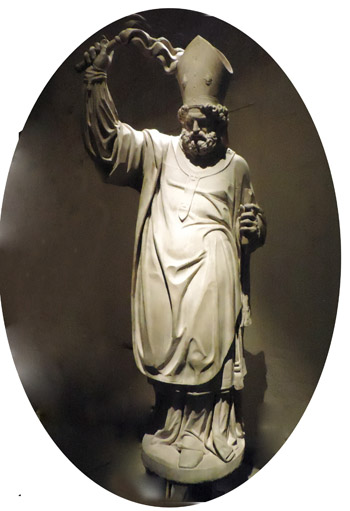 But the Emperor answered: “You may not do that, for Ambrose pays heed to neither the force nor the power of the Emperor, to the end that he holds firmly to the law of God.”
But the Emperor answered: “You may not do that, for Ambrose pays heed to neither the force nor the power of the Emperor, to the end that he holds firmly to the law of God.”
But Ruffin insisted that he be sent to make the Bishop incline to absolve him. And so the Emperor sent Ruffin to Ambrose. And when St. Ambrose saw Ruffin come, he said to him: “Thou hast no more shame than an hound to come so boldly to me.”
Then Ruffin entreated him long to absolve the Emperor. And St. Ambrose said to him: “Certainly I bar to him the entry into the church, and, should he prove himself such a tyrant, I will gladly receive death for such purpose.”
When Ruffin returned to the Emperor and recounted to him what he had done, the Emperor said: “Certainly I shall go to him myself that I may receive of him absolution, for it is well right.”
When he was before the Bishop, he requested of him absolution very devoutly. St. Ambrose asked him what penance he had done for such great wickedness? The Emperor alleged to him that David had sinned and afterwards received mercy.
And St. Ambrose said: “And you have likewise sinned, and must likewise show repentance.”
Then said the Emperor: “It belongs to thee to give and enjoin penance, and I shall do it.”
Then St. Ambrose bade him do make open penance before all the people, and the Emperor received this penance gladly and refused it not.
And St Ambrose said: “An Emperor’s grandest title is to be a son of the Church. An Emperor is in the Church, he is not over her.”
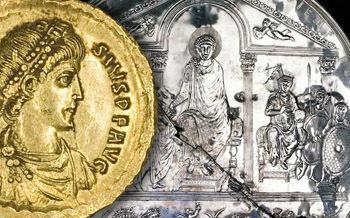 After the Emperor had been reconciled to the Church, he went to stand, as was his custom, in the chancel [reserved for the priest and clerics]. And St. Ambrose asked him: “What seekest thou here?”
The Emperor replied: “I am here to receive the Sacred Mysteries.”
After the Emperor had been reconciled to the Church, he went to stand, as was his custom, in the chancel [reserved for the priest and clerics]. And St. Ambrose asked him: “What seekest thou here?”
The Emperor replied: “I am here to receive the Sacred Mysteries.”
And Ambrose said: “This place belongs to no man but to priests. Go out, for you must be outside the chancel and abide there with the others.” And the Emperor humbly obeyed and went out.
Afterwards, the Emperor went to Constantinople and stood outside the chancel with the lay people. Then the Bishop of Constantinople came to him and told him that he should come into the chancel with the clerks, but he answered that he would not. “For” he said, “I have learned from St. Ambrose what difference there is between an Emperor and a priest. I have found a man of truth, my master Ambrose, and that man is indeed a worthy Bishop.”

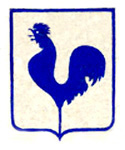

In the year 390 when Ambrose, Archbishop of Milan, refused to give Communion to Emperor Theodosius I
“So then, how can thou be so bold as to enter into the house of God Whom thou has horribly angered? How dare thou with thy feet touch His pavement? How dare thou stretch out thy hands, which be all bloody and from which the blood of innocents runs and drops off? And by what presumption dost thou dare to put forth thy mouth to receive the precious Body and Blood of Our Lord, when from that mouth hast come the command of the Devil? Go away hence! Go away hence! Put not sin upon sin.”
When the Emperor heard these words, he was obedient and began to wail and weep, and returned to his palace and abode there long weeping.
Then Ruffin, the master of his knights, inquired the reason his master was so sorrowful.
He answered Ruffin thus: “You cannot know how great is my sorrow, for I see that servants and poor beggars may enter into the church but I may not enter, for Ambrose hath excommunicated me.” And with every word he sighed in grief.
Then said Ruffin to him: “Let me accompany thee and I shall make him absolve thee.”

Ambrose pictured with a scourge, for he constantly fought Arianism & the pagan sects
But Ruffin insisted that he be sent to make the Bishop incline to absolve him. And so the Emperor sent Ruffin to Ambrose. And when St. Ambrose saw Ruffin come, he said to him: “Thou hast no more shame than an hound to come so boldly to me.”
Then Ruffin entreated him long to absolve the Emperor. And St. Ambrose said to him: “Certainly I bar to him the entry into the church, and, should he prove himself such a tyrant, I will gladly receive death for such purpose.”
When Ruffin returned to the Emperor and recounted to him what he had done, the Emperor said: “Certainly I shall go to him myself that I may receive of him absolution, for it is well right.”
When he was before the Bishop, he requested of him absolution very devoutly. St. Ambrose asked him what penance he had done for such great wickedness? The Emperor alleged to him that David had sinned and afterwards received mercy.
And St. Ambrose said: “And you have likewise sinned, and must likewise show repentance.”
Then said the Emperor: “It belongs to thee to give and enjoin penance, and I shall do it.”
Then St. Ambrose bade him do make open penance before all the people, and the Emperor received this penance gladly and refused it not.
And St Ambrose said: “An Emperor’s grandest title is to be a son of the Church. An Emperor is in the Church, he is not over her.”

Ambrose taught Theodosius
that he was ‘in the Church, not over it’
And Ambrose said: “This place belongs to no man but to priests. Go out, for you must be outside the chancel and abide there with the others.” And the Emperor humbly obeyed and went out.
Afterwards, the Emperor went to Constantinople and stood outside the chancel with the lay people. Then the Bishop of Constantinople came to him and told him that he should come into the chancel with the clerks, but he answered that he would not. “For” he said, “I have learned from St. Ambrose what difference there is between an Emperor and a priest. I have found a man of truth, my master Ambrose, and that man is indeed a worthy Bishop.”







